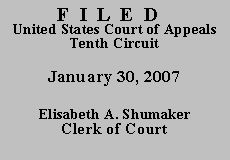

| UNITED STATES OF AMERICA, | No. 06-4115
(D.C. No. 2:04-CR-30DB) (D. Utah) |
However, the district court, applying the U.S. Sentencing Guidelines, gave Mr. Gomez-Gomez an enhanced sentence of 49 months' imprisonment and three years' supervised release because he had previously been convicted of a drug-trafficking offense that constituted an aggravated felony. A deported alien with an aggravated felony conviction who reenters the United States is subject to an enhanced penalty of up to 20 years' imprisonment. See 8 U.S.C. § 1326(b)(2) ("[I]n the case of any alien . . . whose removal was subsequent to a conviction for commission of an aggravated felony, such alien shall be fined under such title, imprisoned not more than 20 years, or both . . ."). Therefore, the 49-month sentence did not exceed the maximum penalty under that provision.
On appeal, Mr. Gomez-Gomez argues that the enhanced penalty provision of 8 U.S.C. § 1326(b)(2) is an element of the offense of reentry after deportation, and that, accordingly, prior convictions triggering the enhanced penalty must be alleged in the indictment. He contends that because his indictment did not refer to any prior convictions, the government did not charge him with an element of the crime for which he was sentenced. Therefore, he argues, the court's sentence exceeded the maximum penalty for the crime of reentry after deportation, which should have been two years.
Settled law makes it clear that the enhanced penalty provision of 8 U.S.C. § 1326(b)(2) is not an element of the offense of reentry after deportation, but instead is a sentencing factor, and therefore need not be alleged in the indictment. "An indictment must set forth each element of the crime that it charges. But it need not set forth factors relevant only to the sentencing of an offender found guilty of the charged crime." Almendarez-Torres v. United States, 523 U.S. 224, 228 (1998) (citations omitted). In Almendarez-Torres, the Supreme Court interpreted the statutory language at issue and concluded that Congress intended to make the enhanced penalty provision of 18 U.S.C. § 1326(b)(2) as "a sentencing factor" rather than "a separate crime," observing that the factors are based on recidivism, a typical sentencing factor Id. at 230.
Mr. Gomez-Gomez argues that this holding is in tension with Apprendi v. New Jersey, in which the Supreme Court held that most factors triggering a sentence enhancement beyond the statutory maximum penalty must be submitted to a jury and proved beyond a reasonable doubt. 530 U.S. 466, 490 (2000). However, the Court carved out an exception for prior convictions, distinguishing them from other enhancement factors on the basis of the "procedural safeguards" inherent to proving the fact of a prior conviction. Id. at 488. As we have noted, regardless of the dicta in Apprendi casting doubt on Almendarez-Torres, the rule remains for charged violations of 18 U.S.C. § 1326 that prior convictions are mere sentencing factors that need not be alleged in indictments. United States v. Martinez-Villalva, 232 F.3d 1329, 1331-32 (10th Cir. 2000).
Mr. Gomez-Gomez concedes that the district court correctly applied current law, and states that he is merely preserving this issue for Supreme Court review. He has done so. We conclude that the district court did not err by considering Mr. Gomez-Gomez's past conviction in applying the enhanced penalty provision of 8 U.S.C. § 1326(b)(2). We AFFIRM.
ENTERED FOR THE COURT
David M. Ebel
Circuit Judge
*.After examining the briefs and appellate record, this panel has determined unanimously to grant the parties' request for a decision on the briefs without oral argument. See Fed. R. App. P. 34(f) and 10th Cir. R. 34.1(G). The case is therefore ordered submitted without oral argument. This order and judgment is not binding precedent, except under the doctrines of law of the case, res judicata, and collateral estoppel. It may be cited, however, for its persuasive value consistent with Fed. R. App. P. 32.1 and 10th Cir. R. 32.1.